IASLC STARS Program for Patient Research Advocates
I have a bachelor’s degree in journalism and a master’s degree in education, so to say that science has never been easy for me is not an understatement! I didn’t actually choose to be a lung cancer research advocate. I feel like it sort of chose me in my quest to find ways to fight the disease, which took my parents and other family members – and that I would eventually also be diagnosed with. As my advocacy journey evolved, I became more involved in research opportunities, so I did what I could to learn about the science and build my confidence. I had to, and still do, labor through the statistics, biology, acronyms, and chemistry to understand what is happening in the research world, but it is an area that desperately needs more advocates, and it has become my passion.
What is the STARS program?
I know that most people interested in becoming a patient research advocate (PRA) are like me and don’t have a science background. And that is why I am so excited about the International Association for the Study of Lung Cancer’s (IASLC) Supportive Training for Advocates on Research & Science (STARS) program.
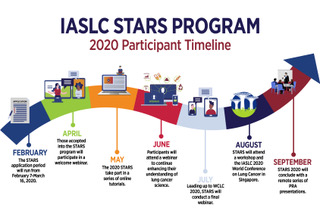 With the science in lung cancer getting more complex, the IASLC recognized that the lung cancer community needed more research advocates. They understood that research advocates need help understanding, evaluating and critiquing the science and then disseminating the information clearly to the lung cancer community. Research advocates also need to be able to communicate effectively with researchers and clinicians. So together, with lung cancer research advocates and patient advocacy nonprofits, the IASLC developed STARS.
With the science in lung cancer getting more complex, the IASLC recognized that the lung cancer community needed more research advocates. They understood that research advocates need help understanding, evaluating and critiquing the science and then disseminating the information clearly to the lung cancer community. Research advocates also need to be able to communicate effectively with researchers and clinicians. So together, with lung cancer research advocates and patient advocacy nonprofits, the IASLC developed STARS.
Training more patient research advocates
STARS was created specifically for the lung cancer community, but its design and content draw on the experiences and lessons learned from research advocacy training programs for other types of cancers. It is a six-month program that includes several web meetings, an in-person workshop, and other events at the IASLC’s World Conference on Lung Cancer (WCLC). The WCLC is the world’s largest meeting dedicated to lung cancer, attracting more than 8,000 physicians, scientists and medical professionals from more than 100 countries. The goal of the meeting is to increase awareness, share information, collaborate and help participants implement the latest developments across the globe. IASLC WCLC 2020 will be held in Singapore, August 8-12.
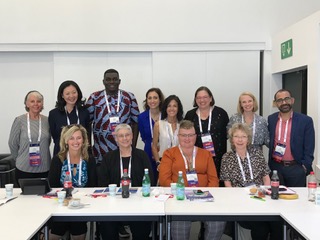 STARS aims to train, develop and nurture lung cancer PRAs in the science and realities of lung cancer research. It will increase the number of PRAs equipped to provide the patient perspective for lung cancer research and provide accurate scientific translation and perspective in lung cancer patient groups.
STARS aims to train, develop and nurture lung cancer PRAs in the science and realities of lung cancer research. It will increase the number of PRAs equipped to provide the patient perspective for lung cancer research and provide accurate scientific translation and perspective in lung cancer patient groups.
Offering guidance and support to other patients
In addition to training PRAs, STARS engages experienced research advocates to serve as mentors to the PRAs. I was honored and humbled to be a mentor for the inaugural STARS program last year. The role of a STARS Mentor is to help guide and encourage patients and caregivers in their efforts to become PRAs. Mentors provide support, share lived examples of research advocacy, help develop scientific understanding and skills, demonstrate effective science communication, and foster PRA comfort in interacting with scientists and clinicians. It’s a unique and valuable part of this program.
Giving lung cancer a face at conferences
Conferences have historically been designed for healthcare professionals, but that is changing, and for the past few years PRAs have been invited to join planning committees and participate in various aspects of the meetings. Our presence keeps the focus on the importance of the work to be done and the lives affected. We humanize the disease and remind everyone that we are not a disease or data; we are people with families and lives to live.
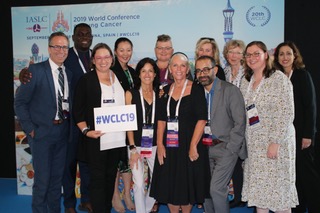 We also provide valuable input. Patients have a perspective and fulfill a role that healthcare professionals can’t - the lived experience! Attending meetings is also an opportunity to hear about cutting edge research, connect with researchers, and ask questions. But it’s more than just hearing about advancements in research and learning about new standards of care. It’s also a chance to meet other advocates from all over the world.
We also provide valuable input. Patients have a perspective and fulfill a role that healthcare professionals can’t - the lived experience! Attending meetings is also an opportunity to hear about cutting edge research, connect with researchers, and ask questions. But it’s more than just hearing about advancements in research and learning about new standards of care. It’s also a chance to meet other advocates from all over the world.
Sharing our story with other lung cancer patients
Cancer can be very overwhelming and seem too complex for many patients and their families to understand. PRAs have an important role in bringing the information learned back to our communities in a way that they can understand and help them to make more informed treatment decisions.
We all have a story, driven by our circumstances, passion and a desire to improve outcomes for all lung cancer patients. As long as our voice remains prominent and the focus is on patients, we will make research and its results more relevant for our community.
Learn more about the STARS program
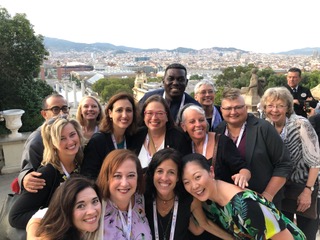 I understand how intimidating it can be when someone doesn’t have a background in science, but I highly encourage advocates from all over the world, with both minimal and extensive research advocacy experience, to learn more about the STARS program on the IASLC website. You will feel empowered and will help to empower others.
I understand how intimidating it can be when someone doesn’t have a background in science, but I highly encourage advocates from all over the world, with both minimal and extensive research advocacy experience, to learn more about the STARS program on the IASLC website. You will feel empowered and will help to empower others.
STARS applications are being accepted now through March 16.
Community Poll
Have you taken our In America Survey yet?
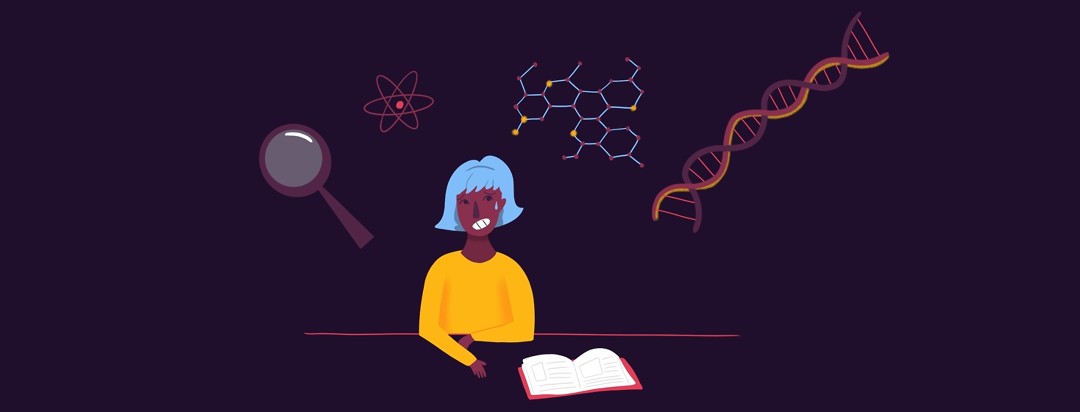
Join the conversation